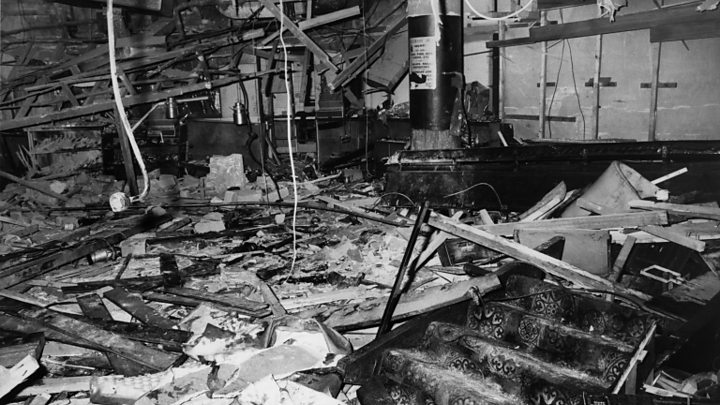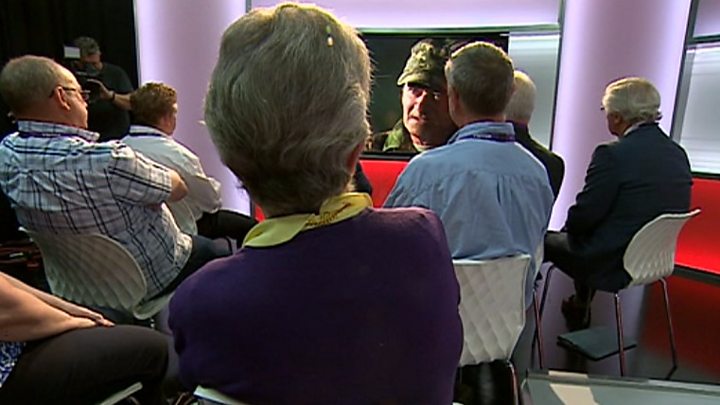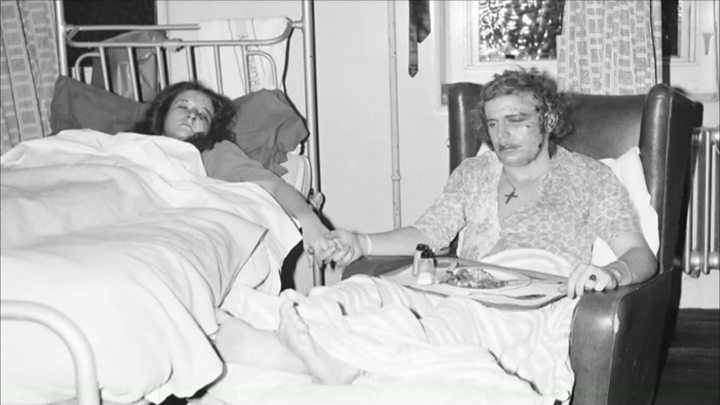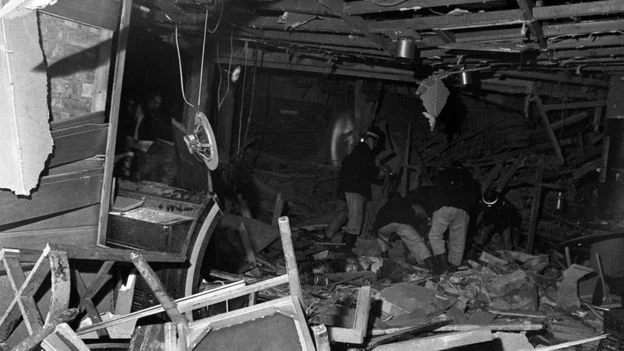A self-confessed IRA bomb maker who has said he was part of the group responsible for the Birmingham pub bombings has issued an apology.
Twenty-one people were killed on 21 November 1974 when bombs exploded in two city centre pubs.
Six innocent men were wrongfully convicted. No-one has ever been brought to justice for one of the worst single losses of life in the Troubles.
Michael Christopher Hayes said he was sorry innocent people were killed.
The 69-year-old, who now lives in south Dublin, refused to say who planted the bombs in the Mulberry Bush and the Tavern in the Town, but said he was speaking out to give "the point of view of a participant".
- Northern Ireland political reaction
- Reaction to bombings interview
- Families react: 'He's a coward - simple as that'
- What were the Birmingham pub bombings?
- 'Wrong place, wrong time' - the Birmingham Six
- Pub bomb inquest 'won't name suspects'
The bombs had not been intended to kill people, he said, adding that there had been a crucial eight-minute delay before police were warned of the bombs' location.
Once he became aware of the death toll from the two bombs, he personally defused a third bomb left on Birmingham's Hagley Road, said Mr Hayes.

Relatives of those killed have rejected the apology as "gutless and spineless".
An inquest into the bombings has been re-opened following a campaign by victims' families, who feel they have been denied justice and that their loved ones have been forgotten.
Victims' relatives have always wanted the names of the suspects to be disclosed at the inquest.
But just last week the coroner ruled that suspects' identities would not be discussed - a ruling denounced by the families as a "whitewash".
West Midlands Police said their investigation remained open and they would respond to "any new significant information to bring those responsible to justice".
"An inquest is due to start and we will not be providing any further comment until the proceedings have concluded," said a police spokesperson.
'Collective responsibility'
In 1990, Michael Hayes was named in a landmark Granada TV programme as one of the men who placed the bombs in the two pubs.
He said he was arrested and questioned by West Midlands Police about the bombings in 1974, but was released.
When asked last week if he planted the bombs, he told BBC News NI: "No comment. No comment.
"I've been accused of a lot of things, without one shred of forensic evidence, without one statement made, without one witness coming out against me."
He said the bombs were made of gelignite, and were planted by two individuals.
Asked if he was one of the two, he replied: "I'm not telling you."
However, he said he took what he called "collective responsibility" for all the IRA's actions in England - including the Birmingham pub bombings.
He said he was in the IRA for more than 30 years in both Ireland and England, adding that he was "a participant in the IRA's activities in Birmingham".
He said: "We were horrified when we heard because it was not intended. I personally defused the third bomb."
Asked what expertise he had that allowed him to do that, he said: "Quite a lot. I specialised in explosives. I knew what I was doing."

He said: "We were horrified when we heard because it was not intended. I personally defused the third bomb."
Asked what expertise he had that allowed him to do that, he said: "Quite a lot. I specialised in explosives. I knew what I was doing."
Michael Hayes said the IRA unit in Birmingham had been shocked by the scale of the death toll.
"It was not the intention of the IRA to kill innocent people," he told BBC News NI.
"That wasn't meant. It wouldn't have been done if that was the case."
'Eight priceless minutes'
He said he thought they had given sufficient time for the police to evacuate the buildings.
"We believed that we gave adequate warnings," he said.
"It was only later on that we realised there was eight valuable minutes missed. We were going to give them a half-hour warning.
"Out of that half hour, eight minutes elapsed - eight priceless minutes."
He said that as he understood it one of the phone boxes used for the telephone warnings was broken and another one was being used.
The former IRA man said he was sorry for the hurt caused to the relatives of those killed.
"My apologies and my heartfelt sympathy to all of you for a terrible tragic loss that you have been put through," he said.
"In all these years that you have been trying to find closure, I hope at last God will be merciful and bring you closure.
"I apologise not only for myself, I apologise for all active republicans who had no intention of hurting anybody and sympathise with you."
'Offensive' apology
Julie Hambleton, whose 18-year-old sister Maxine was killed in the explosions, said an apology from the IRA would be offensive.
"He's a coward, as simple as that," she told the BBC.
"He'll take collective responsibility for those unarmed, innocent people, but won't say who done it?
"He's gutless and spineless," she added. "He's told us nothing, he's admitted nothing."
Michael Hayes has said he would not be attending the inquest into the bombings.
"I would not go along to it. Why should I? What reason would I have to go there? I am just kind of giving this interview.
"That is sufficient. I'm not going back to England."
Meanwhile, the former IRA man insists he has a clear conscience.
"Very much so," he said. "I can sleep at night. Because I am not a murderer."

He said he would rather die than become an informer by naming the real bombers to help free the Birmingham Six, who served 16 years in prison before their sentences were quashed by the Court of Appeal in 1991.
He said: "You would want me to go in and give the name of other men, to become an informer? I'd sooner die in front of you than become an informer."
There will be a BBC News NI special programme on the Michael Hayes interview on BBC 1 Northern Ireland at 22:40 and on the BBC News Channel at 23:30




















